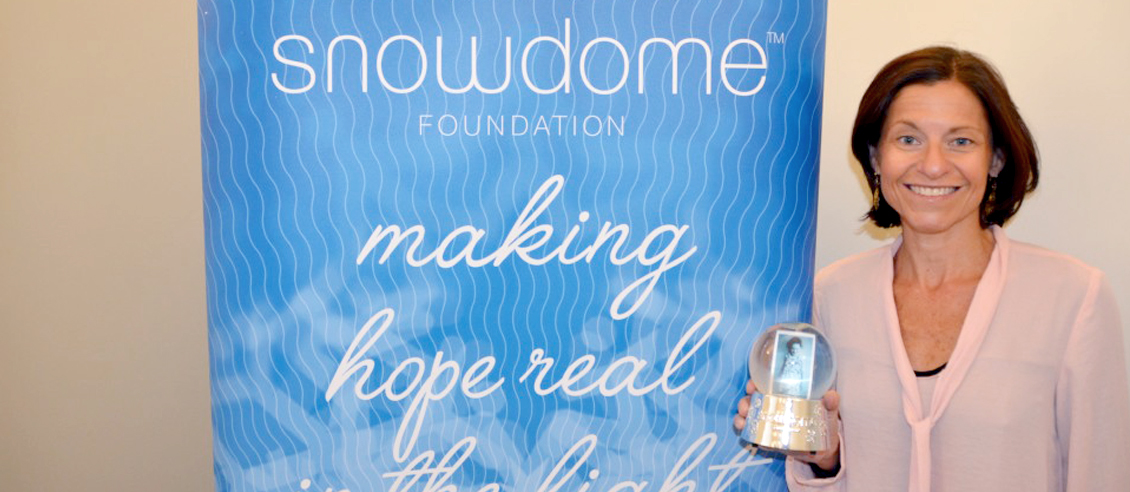Genomic testing provides access to cutting edge treatments for CLL patient

Amanda has an ideal life. She is fit and strong, in her mid 40s and has been married for 18 years. Her and her husband have two sons aged 12 and 15 who keep them active. So when Amanda returned to her teaching job after the summer holidays she thought her colleagues were being overly protective as they enquired about her health. She knew she had lost a few kilos but she was sure it was just a result of all the exercise she was doing. To prove them wrong she asked her father, a GP, to write her a referral for a simple blood test. No one expected the results that came back.
Her father, who was diagnosed with a form of Lymphoma seven years earlier, was the one to break the news to her. Her white blood cell count was too high, more blood tests were ordered along with an appointment with her father’s haematologist, Professor Miles Prince. That was two and half years ago now. At the time Amanda was shocked, she never wondered why me but grappled with how she would tell her two boys. After seeking professional advice she found her voice and shared the news with her family. The facts were she had chronic lymphocytic leukaemia (CLL). While she was incredibly young to have the disease as the majority of patients with CLL are in their sixties, it was still the ‘best’ one to get. CLL is a slow growing leukaemia that affects the B cells, a specialised white blood cell. For most patients with CLL the disease progresses so slowly and remains stable that no treatment is required for years. The course of action is to watch and wait. Amanda and her family had full trust in her haematologist, they watched and waited as her white blood cell count doubled in six months which was not good news.
While Amanda tried not to think about the future with every blood test, she was faced with the reality that one day she would be told she needed to start chemotherapy. Her haematologist approached her about getting genomic testing completed. Amanda’s sample was sent to the Wilson Centre for Lymphoma Genomics to be analysed. The genomics testing assessed the genetic make-up of her tumour, looking for mutations that might indicate whether she would be resistant to chemotherapy or in Amanda’s case it showed she carried a gene mutation that accelerated tumour growth. It meant Amanda was eligible for a clinical trial testing a new combination treatment that was showing positive results overseas. It meant skipping chemotherapy.
It was a big decision, but Amanda decided to enter the clinical trial. She has been on the trial of Venteoclax and ibrutinib for 7 months and her white blood cell count is now in the normal range. While the treatment is not without side effects, the benefits are definitely worth the inconvenience. Being part of a clinical trial has been a huge learning for Amanda. She was in the hospital being monitored up to three times a week during her treatment escalation and is now hoping for a bone marrow result that puts her into the complete remission category. This won’t come til October with the trial closing in May. The level of care, monitoring and follow-up is extraordinary.
Patients like Amanda are what drive Vision Super and the Snowdome Foundation to support blood cancer research. Three years ago, Vision Super looked at their insurance claims data – 25% of their insurance claims were cancer-related and sadly 46% of Vision Super members’ deaths were due to cancer. Vision Super decided they needed to do more to help prevent the devastation cancer creates for their members and families. Vision Super has committed to funding Dr Piers Blombery’s breakthrough genomic testing. Dr Blombery is the Vision Super-Snowdome Fellow. This funding has already made a significant difference to the world of genomics and importantly to Australian blood cancer patients.
Through this whole journey Amanda is in awe of the researchers, scientists and organisations like Vision Super and Snowdome that make funding available to uncover breakthroughs in treatment and diagnosis. Amanda is acutely aware that if she did not have the genomic test she would have been on standard chemotherapy. Instead she has access to next-generation treatments and is feeling very positive about the future. “These doctors are just the smartest people and I am very appreciative of the hope Vision Super and Snowdome are giving people with blood cancers.”
The Snowdome Foundation has advanced Australian genomics blood cancer research through $8 million investment to establish the Centre of Research Excellence in Myeloma at Victorian Comprehensive Cancer Centre and the Christine and Bruce Wilson Centre for Lymphoma Genomics at Peter MacCallum Cancer Centre.
